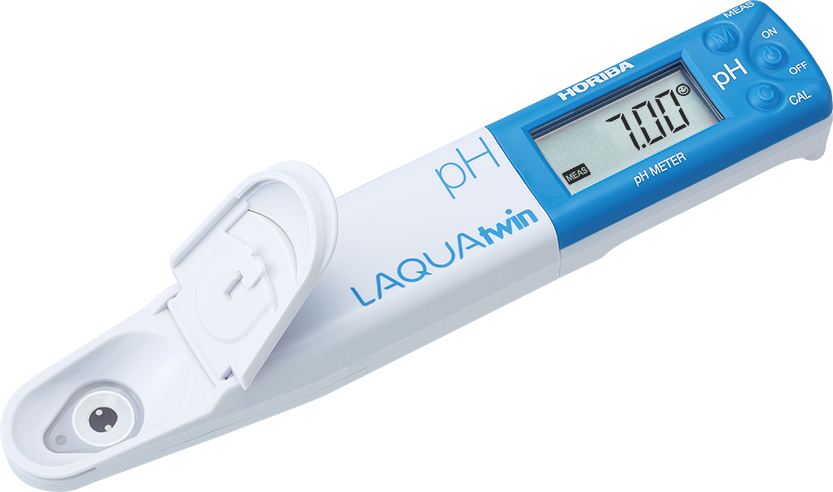Horiba LAQUAtwin pH Meter
The pH value indicates the acidic or basic character of an aqueous solution. The higher the concentration of hydrogen ions in the solution, the lower the pH value.
A dilute aqueous solution with a pH value of less than 7 is considered acidic, with a pH value equal to 7 neutral, and with a pH value greater than 7 basic or even alkaline.
Application examples:
Soil pH for nutrient availability.
Soil pH is a measure of the acidity or alkalinity of the soil. On the pH scale, solutions with a pH of 7 are called "neutral solutions," less than 7 are called "acidic solutions," and greater than 7 are called "basic or alkaline solutions."
The optimum soil pH for healthy growth varies by plant. In general, however, most plants tolerate a soil pH of 6.0-7.5 because the majority of nutrients are available for uptake in this pH range.
In highly acidic soils, aluminum and manganese can become highly available and toxic to the plant, while the occurrence of calcium, phosphorus, and magnesium become lower.
Also, in highly alkaline soils, for example, the concentration of phosphorus and most other micronutrients are reduced.
Accordingly, depending on how the soil is planted, it is useful to know the plant's preferred pH and test the soil for it.
Soil pH can be determined by mixing a soil sample with water and placing the resulting aqueous solution on the sensor and measuring it within a few seconds.
The pH determination will indicate whether the soil is suitable for the plant being grown or may need to be adjusted for optimal plant growth.
pH of cement and concrete for flooring.
Fresh concrete is normally very alkaline and above the neutral point of pH 7. However, if the alkalinity in a concrete subfloor is too high, it can cause the flooring adhesive not to bond properly with the concrete subfloor.
Especially when laying floor tiles, for example, it is very important that the subfloor has a certain pH value in order to bond with the tile adhesive.
To quickly determine the correct pH of the concrete for installing the floor covering or its composite, the Horiba LAQUAtwin pH pocket meter can provide a quick, easy solution, saving time and money.
pH in plant tissue
To classify plant health, the pH value in plant tissue can be determined. At pH levels above 6.4, plants can become susceptible to insect attack, and at pH levels below 6.4, plants can become susceptible to other diseases.
Thus, the goal should be an optimum pH of 6.4 to allow for healthy plant growth. Laboratory analysis of tissue samples is helpful, but often does not provide results for several days or weeks.
Again, a quick alternative method for diagnosing plant health is offered by the LAQUAtwin pH meter.
A few drops of the plant juice of ripe leaves, which can be obtained by Horiba's juice press, are sufficient to determine the pH value.
The highly sensitive sensor determines the corresponding value in a short time.
Other areas of application include the food industry, the industrial production of paints and varnishes, and aquaristics for water quality analysis.
Since the sensor does not dry out, the Horiba Pockettester can be stored dry without any problems.
All Horiba LAQUAtwin pocket testers are dustproof and waterproof.
Application information
- Minimum sample volume: 0.1 ml (0.05 ml with sampling form B).
- pH-11: 2 calibration points, pH-, mV- display
- pH-22: 3 calibration points, pH-, mV- display
- pH-33: 5 calibration points, pH, mV and temperature display
- Automatic calibration
- Automatic buffer recognition: USA & NIST pH buffers
- Automatic temperature compensation
- Temperature calibration: 5 to 40.0 ºC
- Automatic stability / auto hold measurement
- Auto power off: 30 minutes
- Low battery indicator
- IP67 rating dust and waterproof
- Replaceable sensor
- 400 hours battery life: continuous operation without backlighting
- Material: ABS epoxy resin
- Display: custom (monochrome) LCD with backlighting
- Operating conditions: 5 to 40 °C, 85% or less relative humidity
- Warranty: 2 years - meter, 6 months - sensor
- Packed in convenient carrying case
- Supplied with pH 4.01 & 7.00 buffers (14ml each), 2 x CR2032 batteries, pipette, instruction manual and quick reference guide



